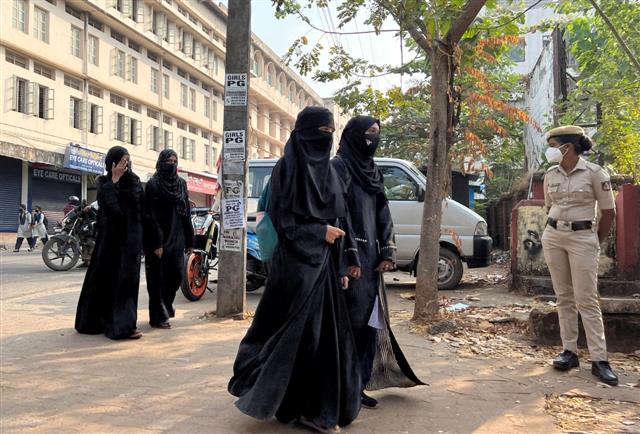Bengaluru:
The Karnataka government on Monday reiterated that Hijab is not an essential religious practice and said religious instructions should be kept outside the educational institutions.
“This is our stand that Hijab is not an essential religious practice. There was a statement by Dr BR Ambedkar in the Constituent Assembly where he said ‘let us keep the religious instructions outside educational institutions’,” Karnataka Advocate General Prabhuling Navadgi told the full bench of the High Court, which is hearing the Hijab case.
The full bench comprises Chief Justice Ritu Raj Awasthi, Justice JM Khazi ,and Justice Krishna M Dixit.
According to the AG, only the essential religious practice gets protection under the Article 25, which guarantees the citizens to practice the faith of their choice. He also referred to “reforms in the religion” as part of the Article 25.
As soon as the proceedings began, CJ Awasthi said certain clarifications were required related to Hijab.
“You have argued that government order is innocuous and the state government has not banned Hijab and not put any restrictions on it. The GO says that the students should wear the prescribed uniform. What is your stand—whether Hijab can be permitted or not in the educational institutions?” the Chief Justice asked.
In reply, Navadgi said if the institutions allow it, then the government would possibly take a decision as and when the issue arises.
On January one, six girl students of a college in Udupi attended a press conference held by Campus Front of India (CFI) in the coastal town protesting against the college authorities denying them entry into the classroom by wearing Hijab.
This was four days after they requested the principal permission to wear Hijabs in classes which was not allowed. Till then, students used to wear Hijab to the campus and entered the classroom after removing the scarves, the college principal Rudre Gowda had said.
“The institution did not have any rule on Hijab-wearing as such and since no one used to wear it to the classroom in the last 35 years. The students who came with the demand had the backing of outside forces,” Rudre Gowda had said.
Meanwhile, many students across the state have boycotted crucial II PUC practical exams that have started on Monday for not being allowed to wear hijab in the classrooms. However, majority of the students, including those from Muslim community, took off their hijab and attended exams.
Bengaluru Police Commissioner Kamal Pant has extended the prohibitory orders surrounding 200 meters of surroundings of schools, PU Colleges, Degree Colleges or other educational institutions till March 8.
If II PUC students remain absent for practical exams they will lose out 30 marks and that will make them get a maximum score of 70 marks in theory exams. To attend CET, the students will have to score a minimum of 45 marks. The scores of practical exams are crucial for the future of students.
The main exams are scheduled between April 16 and May 6. Practical exams will be held for physics, chemistry, biology, psychology, computer science and electronics subjects. The marks will be uploaded to the website of PU Board immediately after exams. If students remain absent for practical exams, no second chance would be given to them.
More than 40 students in Vijayapura district boycotted exams for being asked to remove hijab and staging protests before the District Commissioner’s Office. More than 10 students refused to take off their hijab and waited near Women’s Polytechnic College in Hassan on the premises. Later, they got into an argument with the Principal demanding entry into classes with hijab.
Prohibitory orders will continue in Koppal district till February 26. The district administration has warned that around 300 metre radius more than five people can’t gather. Meanwhile, the six students who started the agitation at Udupi Pre-University Girl’s College have remained absent for the practical exams.
As many as nine students of Madikeri Junior College staged a silent protest at the entrance gate. They sat near the gate holding placards containing messages of ‘hijab is our right, our choice’, ‘we want justice’.
Students of Kolar Government Pre-University College demanded a letter from the Principal for not allowing them with hijab to classrooms. They claimed that the court has consented to the entry of students into colleges, which do not have a college development committee. They have also staged a protest.


